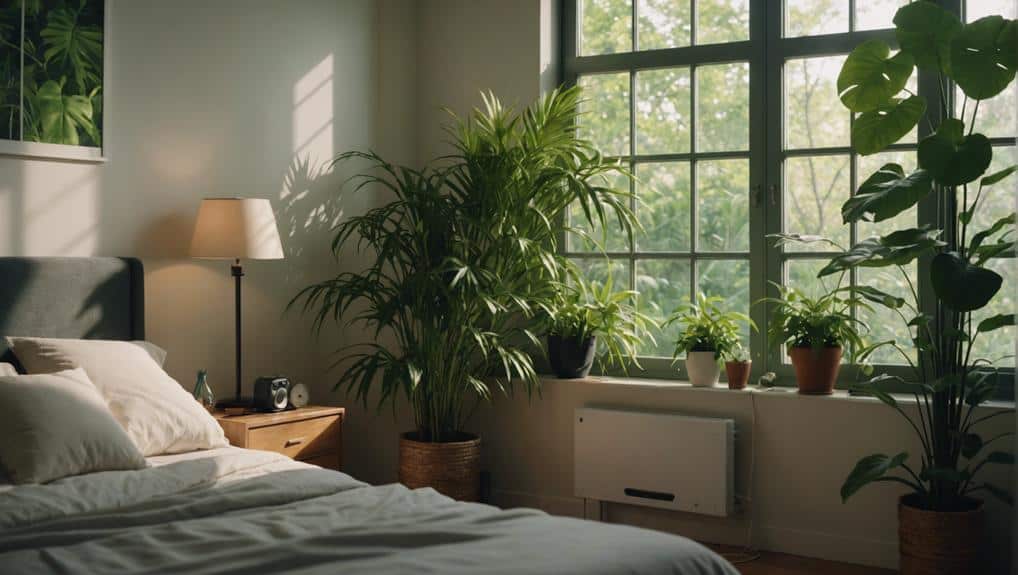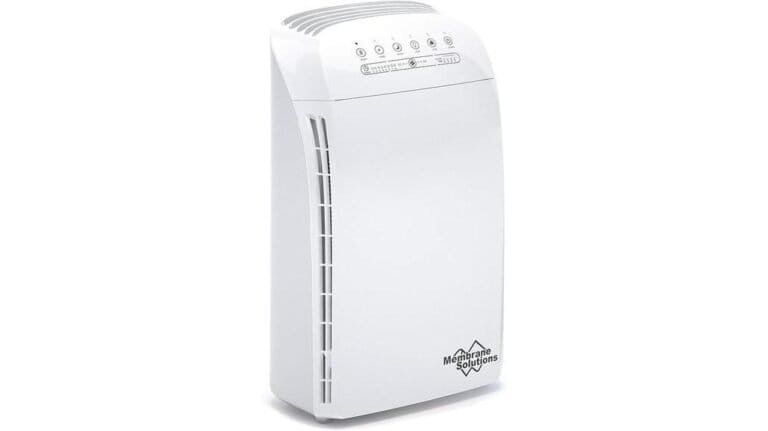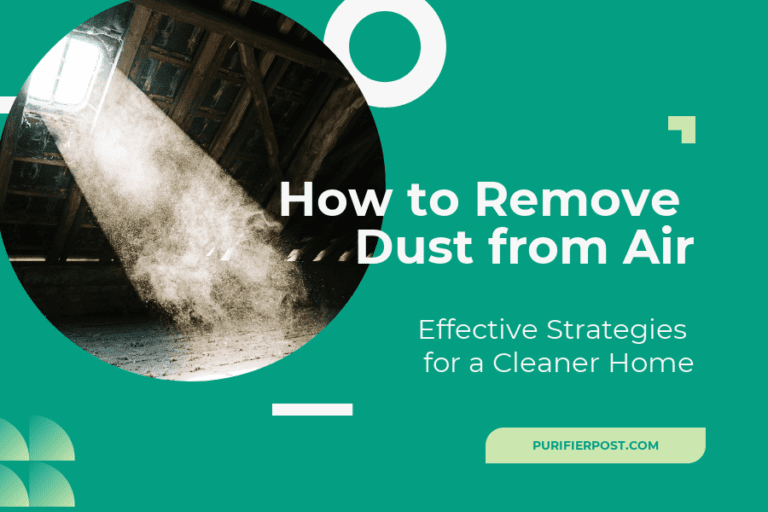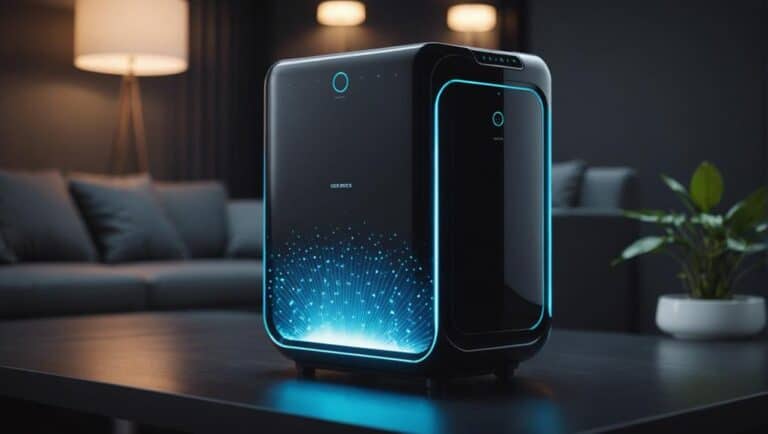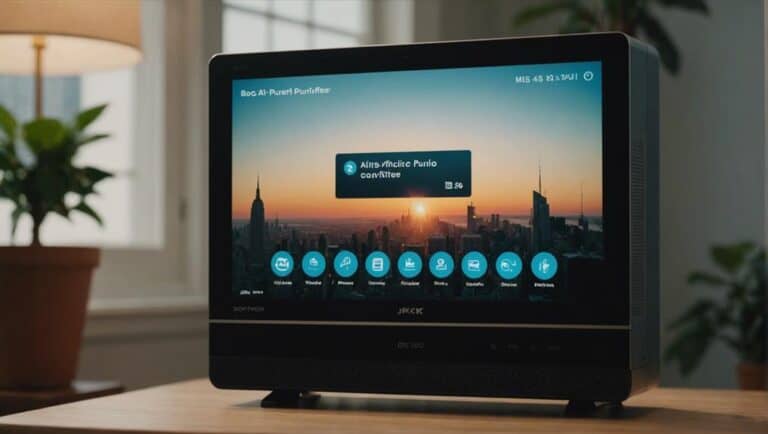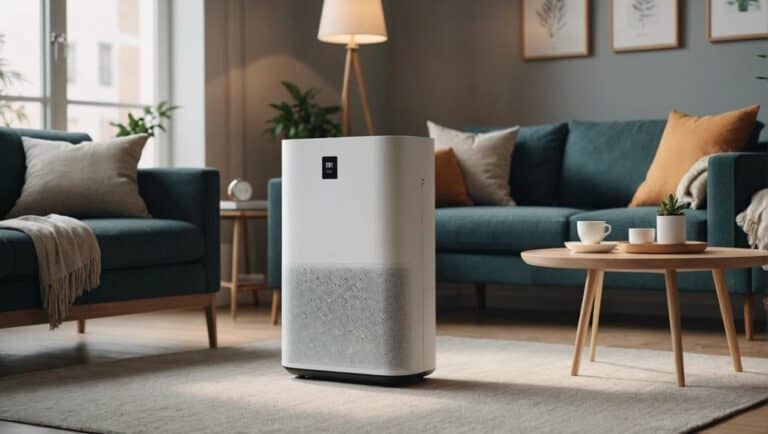What Are the Top Health Benefits of Air Purifiers?
When it comes to air purifiers, the array of health benefits they offer is truly significant. From eliminating allergens to enhancing respiratory health, air purifiers play a vital role in creating a healthier indoor environment. But what specific advantages do they bring beyond just cleaner air? Let’s explore how these devices can positively impact our well-being and provide a sanctuary of fresh, purified air in our homes.
Allergen Removal
Air purifiers with HEPA filters effectively eliminate up to 99.97% of allergens such as pollen and pet dander, improving indoor air quality and reducing allergy symptoms. By trapping microscopic particles, HEPA filters guarantee that we breathe cleaner air, free from common triggers like pet dander and pollen.
This reduction in allergens is particularly beneficial for individuals with asthma, as it helps alleviate symptoms and improve respiratory health. With improved indoor air quality, the chances of experiencing allergy-related issues like sneezing, coughing, and congestion are greatly reduced.
The use of HEPA filters in air purifiers plays an important role in creating a healthier environment by removing these irritants, ultimately contributing to a more comfortable and controlled living space. Embracing air purifiers with HEPA filters is a proactive step towards enhancing our well-being, especially for those sensitive to allergens.
Asthma Trigger Reduction
Air purifiers equipped with HEPA filters can greatly reduce asthma triggers such as pet dander, pollen, and dust mites. By eliminating these airborne allergens, air purifiers help alleviate asthma symptoms and decrease the likelihood of asthma attacks.
We can breathe easier knowing that cleaner indoor air provided by air purifiers contributes to preventing allergies and maintaining a healthier environment for all.
Asthma Symptom Relief
Using high-efficiency particulate air (HEPA) filters in purifiers significantly reduces asthma triggers, providing relief from symptoms such as pollen, pet dander, and dust mites. Asthma symptom relief is essential for managing respiratory health and improving overall well-being.
Air purifiers equipped with HEPA filters effectively capture allergens, ensuring cleaner indoor air quality and minimizing exposure to asthma triggers. By eliminating airborne particles that can exacerbate asthma, these devices contribute to symptom management, allowing individuals to breathe easier and experience fewer asthma attacks.
The reduction of indoor allergens and pollutants through HEPA filtration promotes a healthier environment for asthma patients, supporting better respiratory health and enhancing overall quality of life.
Cleaner Indoor Air
Minimizing indoor pollutants is essential for reducing asthma triggers and promoting respiratory health. Air purifiers play a vital role in achieving cleaner indoor air by effectively removing common triggers such as dust, pet dander, and pollen.
HEPA filters within air purifiers specifically target allergens, helping to alleviate asthma symptoms and enhance overall respiratory health. By capturing asthma triggers like dust mites and mold spores, air purifiers create a safer environment for individuals with asthma, leading to a significant reduction in respiratory irritation.
Improved indoor air quality through the use of air purifiers not only minimizes asthma triggers but also enhances the quality of life for those suffering from asthma, ultimately ensuring better air quality and respiratory well-being.
Allergy Prevention
Shifting our focus from cleaner indoor air to allergy prevention, we emphasize the importance of reducing asthma triggers through the use of air purifiers with HEPA filters.
HEPA filters in air purifiers effectively trap allergens such as pollen and pet dander, helping to decrease asthma triggers. By removing airborne particles, these purifiers prevent respiratory irritation and asthma attacks caused by allergens. Individuals with asthma benefit from improved indoor air quality as HEPA filters can notably diminish the risk of asthma exacerbations.
Air purifiers also reduce exposure to common triggers like dust mites and pet dander, promoting better respiratory health and decreasing asthma symptoms. Using air purifiers is a proactive step towards controlling indoor air quality and preventing allergy-related asthma issues.
Virus Exposure Risk Reduction
Air purifiers equipped with HEPA filters are highly effective in capturing viruses, consequently lowering the risk of airborne transmission.
Research indicates that using air purifiers can greatly reduce exposure to common viruses such as the flu and cold.
Virus Protection
To enhance indoor air quality and reduce the risk of virus exposure, utilizing air purifiers with HEPA filters is highly effective. HEPA filters are essential in capturing and removing airborne viruses, promoting a healthier indoor environment.
Here are three key benefits of virus protection with air purifiers:
- Efficiency: HEPA filters have a 99.97% efficiency rate in trapping particles as small as 0.3 microns, including airborne viruses like the flu and common cold.
- Safety: Air purifiers help safeguard individuals, especially those with weakened immune systems, from airborne diseases transmitted by viruses.
- Cleaner Living Space: Research shows that air purifiers significantly reduce the presence of viruses in the air, contributing to a safer and cleaner living space.
Improved Respiratory Health
Regularly using air purifiers with HEPA filters can effectively reduce the risk of virus exposure indoors, leading to improved respiratory health outcomes. HEPA filters in air purifiers are highly efficient in capturing virus particles, enhancing indoor air quality.
By minimizing the presence of viruses in the air, these air purifiers contribute to better respiratory health and lower the risk of infections. Investing in an air purifier with virus-capturing capabilities is particularly beneficial for individuals with respiratory conditions, as it creates a cleaner and safer indoor environment.
Studies have demonstrated the positive impact of using air purifiers on respiratory health by reducing virus exposure, highlighting the importance of incorporating this technology to maintain optimal indoor air quality and overall well-being.
Airborne Particle Reduction

One essential aspect to keep in mind when evaluating air purifiers is their effectiveness in reducing airborne particles that can trigger allergies and impact respiratory health. Air purifiers equipped with HEPA filters play an important role in combating indoor pollutants and enhancing indoor air quality for individuals prone to allergic diseases.
Here are three key points to ponder regarding airborne particle reduction:
- HEPA filters in air purifiers efficiently remove a wide range of airborne pollutants such as PM2.5, pollen, dust mites, pet dander, and mold particles, notably reducing the presence of allergens in the air.
- Studies have shown that air purifiers with HEPA filters can alleviate nasal symptoms in individuals suffering from allergies to substances like grass pollen, demonstrating the positive impact on respiratory health.
- By trapping allergens effectively, air purifiers contribute to creating a cleaner indoor environment, which is especially beneficial for those with allergic sensitivities and respiratory issues.
Odor Elimination
Eliminating odors in indoor spaces is a key benefit of using air purifiers equipped with activated carbon filters. These filters effectively trap gases and particles from volatile organic compounds (VOCs), cooking odors, smoke, and various household activities.
By removing these odors, air purifiers contribute to enhancing productivity and overall well-being by maintaining a clean indoor environment with fresh and pleasant air. The activated carbon filters within air purifiers play an essential role in eliminating unpleasant smells, creating a more comfortable and inviting atmosphere in homes and workspaces.
This odor elimination not only improves indoor air quality but also has a significant impact on respiratory health. By reducing the presence of household odors, air purifiers help in creating a healthier living space where individuals can breathe easier and enjoy a cleaner environment, ultimately leading to a better quality of life.
Dust Minimization

We all know how frustrating dust can be in our homes, triggering allergies and creating a constant need for cleaning. Air purifiers are a game-changer in this aspect, as they effectively reduce dust levels and help alleviate respiratory issues.
With HEPA filters capable of capturing tiny dust particles, these devices play an essential role in maintaining a cleaner and healthier indoor environment.
Allergy Relief
Air purifiers equipped with HEPA filters effectively reduce dust in the air, providing relief for individuals suffering from allergies triggered by dust mites. Here’s how they help with allergy relief:
- Trapping Dust: HEPA filters in air purifiers capture microscopic dust particles, preventing them from circulating in the indoor air.
- Alleviating Symptoms: Reduced dust levels can alleviate sneezing, coughing, and other respiratory issues related to dust allergies.
- Creating Cleaner Environment: By capturing dust particles, air purifiers create a cleaner indoor environment that benefits individuals sensitive to dust.
Using air purifiers with HEPA filters can greatly improve indoor air quality, leading to enhanced respiratory health and overall well-being.
Improved Respiratory Health
Minimizing dust in indoor spaces through the use of air purifiers enhances respiratory health by reducing irritants that can trigger allergies and respiratory issues.
Air purifiers effectively capture dust particles, helping to improve respiratory health by reducing coughing and sneezing.
They’re particularly beneficial in filtering out common allergens like dust mites, which can lead to respiratory irritation.
By enhancing indoor air quality and decreasing dust levels, air purifiers contribute to clearer airways and better lung function.
Individuals with respiratory conditions can benefit from the minimized dust in the environment created by air purifiers, promoting overall improved respiratory health and creating a more comfortable breathing space.
Improved Sleep Quality
By decreasing exposure to allergens like dust and pet dander, air purifiers in the bedroom contribute to better sleep quality. The improved air quality created by these devices can promote better sleep by reducing allergens that may cause respiratory irritation.
Placing air purifiers strategically on the nightstand or dresser optimizes their performance for a restful night’s sleep. Combining air purification with good air quality habits, such as keeping windows closed during high pollen seasons, can greatly enhance sleep quality and overall well-being.
Here are three ways air purifiers help improve sleep quality:
- Reducing Allergens: Air purifiers filter out dust, pollen, and pet dander from the bedroom air, creating a cleaner sleep environment.
- Minimizing Respiratory Irritation: By removing airborne particles, air purifiers help reduce the potential triggers for respiratory issues that can disrupt sleep.
- Enhancing Sleep Environment: Placing air purifiers strategically can optimize their performance, ensuring a peaceful and undisturbed night’s rest.
Respiratory Health Enhancement

Improving respiratory health through the use of air purifiers with HEPA filters has been proven effective in trapping and removing allergens that can exacerbate respiratory conditions. HEPA filters in air purifiers play an essential role in capturing common indoor pollutants such as pollen, pet dander, and dust mites, which are known to trigger asthma attacks and worsen respiratory health.
By maintaining clean indoor air quality, air purifiers help reduce the risk of respiratory infections and promote better breathing for overall well-being. Individuals with asthma or allergies can benefit greatly from the removal of allergens like pet hair and pollen, leading to relief from asthma symptoms and improved respiratory health.
Additionally, the reduction of airborne particles by air purifiers contributes to enhanced respiratory health and ultimately leads to better sleep quality, making a significant difference in overall wellness.
Allergy Prevention
Air purifiers equipped with HEPA filters are effective in capturing and removing allergens like pollen, pet dander, and dust mites to prevent allergic reactions. HEPA filters are crucial in allergy prevention as they trap these allergens, ensuring cleaner indoor air quality.
Here are three key benefits of using air purifiers for allergy prevention:
- Efficiency: HEPA filters have an impressive 99.97% efficiency rate in capturing allergens, making them highly effective in reducing allergic reactions.
- Symptom Alleviation: By reducing airborne allergens, air purifiers help alleviate common allergy symptoms such as sneezing, itching, and congestion, providing relief for allergy sufferers.
- Better Rest: Placing an air purifier in the bedroom creates an allergen-free sleep environment, promoting improved rest and minimizing allergy triggers that may disrupt sleep patterns.
For individuals looking to take control of their indoor environment and decrease allergic reactions, incorporating air purifiers with HEPA filters can significantly enhance their quality of life by improving indoor air quality and promoting better rest.
Overall Well-being Promotion
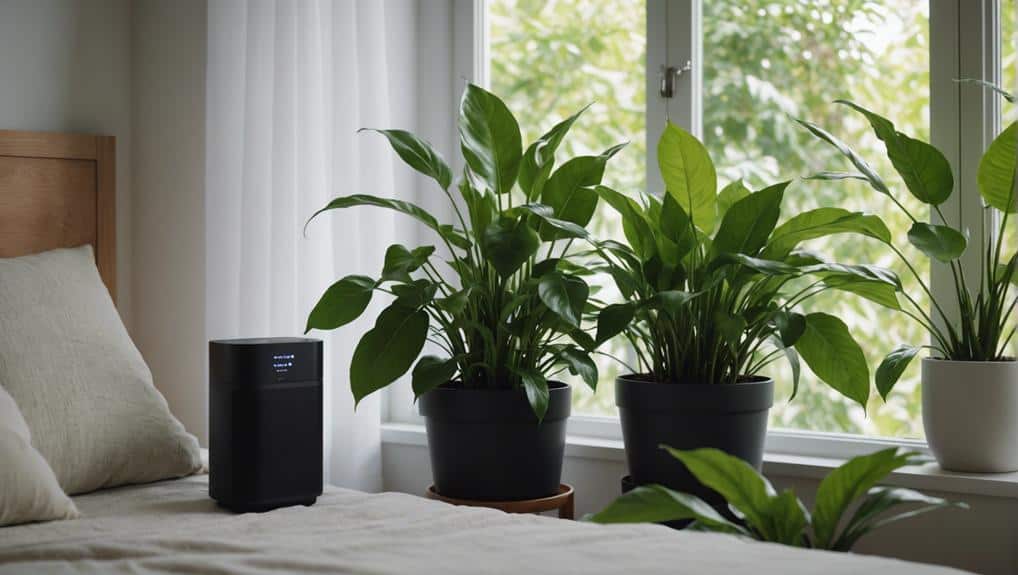
To enhance our overall well-being, we must prioritize reducing exposure to indoor pollutants through the use of air purifiers.
Air purifiers play an essential role in improving indoor air quality by eliminating common irritants like pollen, pet dander, and volatile organic compounds (VOCs). This enhancement in air quality leads to better respiratory health and a reduction in allergy symptoms, contributing to a healthier living environment.
Additionally, air purifiers are effective in capturing bacteria and viruses, thereby minimizing the risk of airborne diseases and promoting overall well-being. For individuals suffering from asthma or allergies, the presence of air purifiers can alleviate symptoms and maintain clean indoor air, fostering a sense of control over their health.
Better air quality resulting from the use of air purifiers has been linked to improved sleep quality, increased productivity, and a general feeling of well-being, highlighting the significant impact these devices can have on our daily lives.
Conclusion
Overall, air purifiers offer a wide range of health benefits, from reducing allergens and asthma triggers to improving respiratory health and overall well-being.
By effectively removing indoor pollutants and viruses, air purifiers create a cleaner and healthier living environment, leading to better sleep quality and allergy prevention.
Investing in an air purifier can greatly enhance the quality of the air we breathe and promote a healthier lifestyle for everyone in the household.
